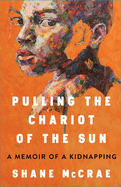
Poet Shane McCrae's moving memoir, Pulling the Chariot of the Sun, recounts and transcends the distressing facts of being kidnapped from his Black father and raised by abusive, white supremacist grandparents. In a piercing interrogation of memory, he compares his recollections with the historical record to reveal how trauma can cause partial amnesia.
At his birth, McCrae was pronounced "dead." On his birth certificate, his grandmother "indicated I was white." He didn't learn his father's first name until he was nine years old; even then, confusion remained as to whether his name was Stanley or Stan Lee. "But I am not the story I was told," McCrae writes. This is an account of how he reclaimed his life and found his identity as a mixed-race man.
McCrae's father was African American, while his mother's family was white; she was 18 and had broken up with his father by the time he was born. When McCrae was three, his maternal grandparents convinced his mother that he'd be better off with them, then they convinced his father to let him go on a weekend trip with them. When his father went to their house on Monday morning to pick up Shane, they had skipped town for Texas. They threatened their daughter: if she told Shane's father where he was, they would disappear to Mexico and she would never see her son again.
The author grew up calling his grandparents "Mom" and "Dad" and rarely saw his mother. Only later in life did he realize that what happened to him could be called a kidnapping. Well before he realized a crime had been committed against him, he knew his grandparents' motivation was racial: "[T]hey kidnapped me to get me away from blackness." He was taught to associate his father--and, by extension, Blackness--with badness and abandonment. It was a toxic living situation as he was forced to endure his grandfather's beatings and his grandparents' overt approval of Nazi ideology.
The family moved often, leading up to and also after his grandparents' divorce when he was 14. McCrae had to adjust to new schools frequently and struggled academically. As a teenager, he veered between popularity and ostracism, developing interests in skateboarding and "shoegaze" music. He sums up his teenage attitude with this heartbreaking phrase: "I didn't aspire to be more than the harm done to me." Poetry was his way of coping with traumatic memories. After hearing a Sylvia Plath poem at school, he wrote his own first poems when he was 15. Teachers encouraged him, relieved to see him "putting effort into something."
McCrae is the author of eight poetry collections. Even in his prose, poetic techniques are still on clear display: run-on sentences and looping phrases create captivating rhythms; the repeated use of "except" refrains mimics his doubt in an artful way:
"Nonetheless, when I try to recall what I felt like as a child, in a general sense, what I felt like as a child on an ordinary day, though ordinary days are the most difficult days to remember, except, for me, those days upon which I was beaten, the beatings themselves for me so far almost impossible to remember, easy to say I was hit so hard I was knocked out of my own mind, my own memory, but the truth is I don't know how hard I was hit, except I know at least once, when I was thirteen or fourteen, my grandfather hit me so hard and with such anger my grandmother thought he would kill me."
Although there is a chronological through line to the book, there are also diversions along the way as McCrae skips between meaningful places and times. Amid the impressionistic memories of childhood are hints of his grandmother's later hoarding and Alzheimer's disease. The scenes he zooms in on can feel arbitrary, until readers see how they are chosen in a way that is true to how the mind selectively retains images from childhood: a mound of quartz near a creek where he found dead fish relates to his associations with whiteness; spray-painting the neighbors' black Labrador retrievers green relates to his associations with Blackness.
As much as McCrae is reconstructing his memory of events, he is also deconstructing it. He presents a scene he remembers only to undermine his own confidence--an uncertainty he attributes to trauma. Sometimes a photograph corrects a false memory, or fills in what he calls "tangible lacunae." He has a gift for apt metaphors, another mark of the poet: "Living with blocked memories... [is] like being a plant with roots that don't touch anything."
The title comes from the Greek myth of Phaethon, who borrows a chariot to find his father, the Sun god Helios. He sometimes drives too close to the Sun, and sometimes too far away, causing the seasonal patterns of summer and winter. McCrae uses this allusion to evoke loneliness, determination and presumption and to presage his own search for his father. "A father is more a wish than a man," he writes of his childhood perspective, but before the book's end he will strive to turn this wish into a reality. Pulling the Chariot of the Sun is a heartrending memoir for readers of Dreams from My Father by Barack Obama and Memorial Drive by Natasha Trethewey. --Rebecca Foster

